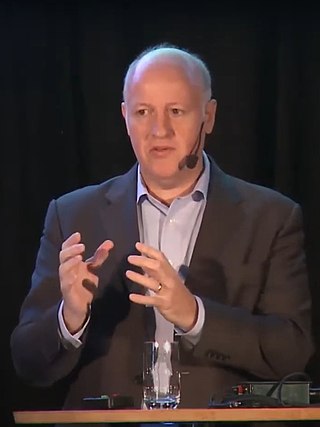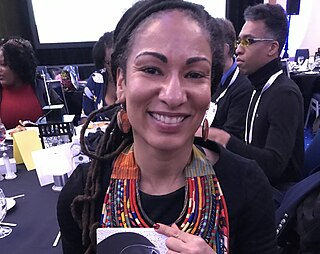Related Research Articles
In academic publishing, a retraction is a mechanism by which a published paper in an academic journal is flagged for being seriously flawed to the extent that their results and conclusions can no longer be relied upon. Retracted articles are not removed from the published literature but marked as retracted. In some cases it may be necessary to remove an article from publication, such as when the article is clearly defamatory, violates personal privacy, is the subject of a court order, or might pose a serious health risk to the general public.
James Sherley is a biological engineer and the founder of Asymmetrex, an adult stem cell research center. He has also conducted research at the Boston Biomedical Research Institute and Massachusetts Institute of Technology (MIT). Sherley filed a suit against the government in Sherley v. Sebelius, resulting in a protracted legal battle attempting to ban the government from funding any research relating to embryonic stem cells.

Sexism in academia refers to the discrimination and subordination of a particular sex or gender academic institutions, particularly universities, due to the ideologies, practices, and reinforcements that privilege one sex or gender over another. Sexism in academia is not limited to but primarily affects women who are denied the professional achievements awarded to men in their respective fields such as positions, tenure and awards. Sexism in academia encompasses institutionalized and cultural sexist ideologies; it is not limited to the admission process and the under-representation of women in the sciences but also includes the lack of women represented in college course materials and the denial of tenure, positions and awards that are generally accorded to men.
Danielle N. Lee is an American assistant professor of biology at Southern Illinois University Edwardsville, best known for her science blogging and outreach efforts focused on increasing minority participation in STEM fields. Her research interests focus on the connections between ecology and evolution and its contribution to animal behavior. In 2017, Lee was selected as a National Geographic Emerging Explorer. With this position Lee traveled to Tanzania to research the behavior and biology of landmine-sniffing African giant pouched rats.
Jedidah C. Isler is an American astrophysicist, educator, and an active advocate for diversity in STEM. She became the first African-American woman to complete her PhD in astrophysics at Yale in 2014. She is currently an assistant professor of astrophysics at Dartmouth College. Her research explores the physics of blazars and examines the jet streams emanating from them. In November 2020, Isler was named a member of Joe Biden's presidential transition Agency Review Team to support transition efforts related to the National Aeronautics and Space Administration.

Chanda Prescod-Weinstein is an American theoretical cosmologist and particle physicist at the University of New Hampshire. She is also an advocate of increasing diversity in science.
Jessica Polka is a biochemist and the Executive Director of ASAPbio, a non-profit initiative promoting innovation and transparency via preprints and open peer review. She was one of the organizers of a recent meeting they held on scholarly communication.

Brian D. Nord is an American astrophysicist and machine learning researcher at Fermi National Accelerator Laboratory.

The Wuhan Institute of Virology, Chinese Academy of Sciences is a research institute on virology administered by the Chinese Academy of Sciences (CAS), which reports to the State Council of the People's Republic of China. The institute is one of nine independent organisations in the Wuhan Branch of the CAS. Located in Jiangxia District, Wuhan, Hubei, it was founded in 1956 and opened mainland China's first biosafety level 4 (BSL-4) laboratory in 2018. The institute has collaborated with the Galveston National Laboratory in the United States, the Centre International de Recherche en Infectiologie in France, and the National Microbiology Laboratory in Canada. The institute has been an active premier research center for the study of coronaviruses.
Julie Carol Libarkin is a professor of Earth Sciences and Director of the Geocognition Laboratory at Michigan State University. Her research considers how people understand and make decision about the planet. She is a Fellow of the Geological Society of America. She also researches and addresses inequality in academia, and tracks academic sexual misconduct cases.

Peter Daszak is a British zoologist, consultant and public expert on disease ecology, in particular on zoonosis. He is the president of EcoHealth Alliance, a nonprofit non-governmental organization that supports various programs on global health and pandemic prevention. He is also a member of the Center for Infection and Immunity at the Columbia University Mailman School of Public Health. He lives in Suffern, New York.

Black Birders Week is a week-long series of online events to highlight Black nature enthusiasts and to increase the visibility of Black birders, who face unique challenges and dangers when they are engaged in outdoor activities. The event was created as a response to the Central Park birdwatching incident and police brutality against Black Americans. The inaugural event ran from May 31st May to 5th June, 2020. The week of events was organized by a group of STEM professionals and students known as the BlackAFinSTEM collective.

Brittany Lehua Kamai is an American astrophysicist and racial justice activist. Kamai is a postdoctoral fellow at the University of California, Santa Cruz and the California Institute of Technology. She was the founder of #ShutDownSTEM, part of the Strike for Black Lives held on June 10, 2020. A native Hawaiian, Kamai grew up in Honolulu and graduated from President Theodore Roosevelt High School and the University of Hawaiʻi at Mānoa. She completed her Master of Arts from Fisk University and her PhD from Vanderbilt University. Kamai is only the second native Hawaiian to earn a doctorate in astrophysics and the third to earn a PhD in physics.

Shardé M. Davis is an Afro-American academic who created the hashtag #BlackintheIvory, which was popularised on Twitter in the wake of widespread protests following the murder of George Floyd.
BlackInChem is an organization which aims to highlight and increase the visibility of Black chemists. The organization was created as a response to Black Birders Week. The inaugural event ran from August 10 - 15, 2020.

Black in AI, formally called the Black in AI Workshop, is a technology research organization and affinity group, founded by computer scientists Timnit Gebru and Rediet Abebe in 2017. It started as a conference workshop, later pivoting into an organization. Black in AI increases the presence and inclusion of Black people in the field of artificial intelligence (AI) by creating space for sharing ideas, fostering collaborations, mentorship, and advocacy.

Jessica Esquivel is a Black Mexican and American physicist and science communicator, working at the Muon g-2 particle physics experiment at Fermilab. She is an advocate for gender and racial equity in science, and a lead organiser of #BlackInPhysics, a campaign to recognize and amplify the work of Black physicists worldwide. She was also selected as an AAAS IF/THEN Ambassador in 2019.
Picture a Scientist is a 2020 documentary highlighting gender inequality in science. The movie tells the stories of several prominent female researchers, and brings to light the barriers they encountered, including cases of discrimination and harassment. The movie features MIT's professor of biology Nancy Hopkins, the chemist Raychelle Burks and the geoscientist Jane Willenbring, among other scientists.
Black In Neuro is a grassroots initiative that looks to connect, celebrate and amplify black voices working in neuroscience. In particular, Black in Neuro looked to increase visibility of black neuroscientists, who face challenges in navigating the majority white world of academia. The group was created as a response to the Black Lives Matter movement and the #BLACKandSTEM initiatives that were inspired worldwide. The inaugural event ran from July 27 – August 2, 2020, and they have hosted annual Black In Neuro Week events since.

The African Society of Human Genetics (AfSHG) is a learned society and professional membership organization focused on the study of human genetics and genomics in Africans, and open to researchers who are interested in the subject. It has played a role in founding several national genetics societies, and is affiliated with the societies of Cameroon, the Democratic Republic of the Congo, Mali, Egypt, Rwanda, Senegal, South Africa, and Tanzania.
References
- ↑ Subbaraman, Nidhi (2020-06-08). "Grieving and frustrated: Black scientists call out racism in the wake of police killings". Nature. 582 (7811): 155–156. Bibcode:2020Natur.582..155S. doi:10.1038/d41586-020-01705-x. PMID 32518341. S2CID 256821984.
- ↑ "Physicists come out in support of today's Strike for Black Lives". Physics World. 2020-06-10. Retrieved 2020-12-04.
- ↑ "Take Action". #ShutDownAcademia #ShutDownSTEM. Archived from the original on 2020-11-20. Retrieved 2020-12-04.
- 1 2 3 Chen, Sophia (2020-06-09). "Researchers around the world prepare to #ShutDownSTEM and 'Strike For Black Lives'". Science | AAAS. Retrieved 2020-12-04.
- 1 2 "Particles for Justice". Particles for Justice. Retrieved 2020-12-04.
- ↑ "About". #ShutDownAcademia #ShutDownSTEM. Archived from the original on 2021-11-10. Retrieved 2020-12-04.
- 1 2 3 4 Subbaraman, Nidhi (2020-06-09). "Thousands of scientists worldwide to go on strike for Black lives". Nature. doi:10.1038/d41586-020-01721-x. PMID 32523071. S2CID 219586791.
- ↑ Newburger, Emma (2020-06-10). "Thousands of scientists go on strike to protest systemic racism in STEM". CNBC. Retrieved 2020-12-04.
- ↑ Overbye, Dennis (2020-06-10). "For a Day, Scientists Pause Science to Confront Racism". The New York Times. ISSN 0362-4331 . Retrieved 2020-12-04.
- ↑ "Note from the editors: Nature joins #ShutDownSTEM". Nature. 2020-06-10. doi:10.1038/d41586-020-01723-9. PMID 32523069. S2CID 219586160.
- ↑ "#ShutDownSTEM". MIT School of Science. Retrieved 2020-12-04.
- ↑ "Scientists strike for black lives, a more inclusive academia". www.insidehighered.com. 11 June 2020. Retrieved 2020-12-04.
- ↑ "ASU supports #ShutDownSTEM". ASU Now: Access, Excellence, Impact. 2020-06-10. Retrieved 2020-12-04.
- ↑ "Why RockEDU is Participating in #ShutDownSTEM". RockEDU. Retrieved 2020-12-04.
- ↑ "#ShutDownStem". Optical Society.
- ↑ "#ShutDownSTEM at Transform". swung. 7 June 2020. Retrieved 2020-12-04.
- ↑ "UB scientists confront racism". www.buffalo.edu. Retrieved 2020-12-04.
- ↑ "Here's How BU Researchers #ShutDownSTEM to Combat Racism in Research and Academia". Boston University. Retrieved 2020-12-04.
- ↑ "#ShutDownSTEM". All Together. 2020-09-16. Retrieved 2020-12-04.
- ↑ "Earth Institute Solidarity and Support for #ShutDownSTEM". State of the Planet. 2020-06-09. Retrieved 2020-12-04.
- ↑ "For a day, Harvard science shuts down to #Strike4BlackLives". Harvard Gazette. 2020-06-11. Retrieved 2020-12-04.